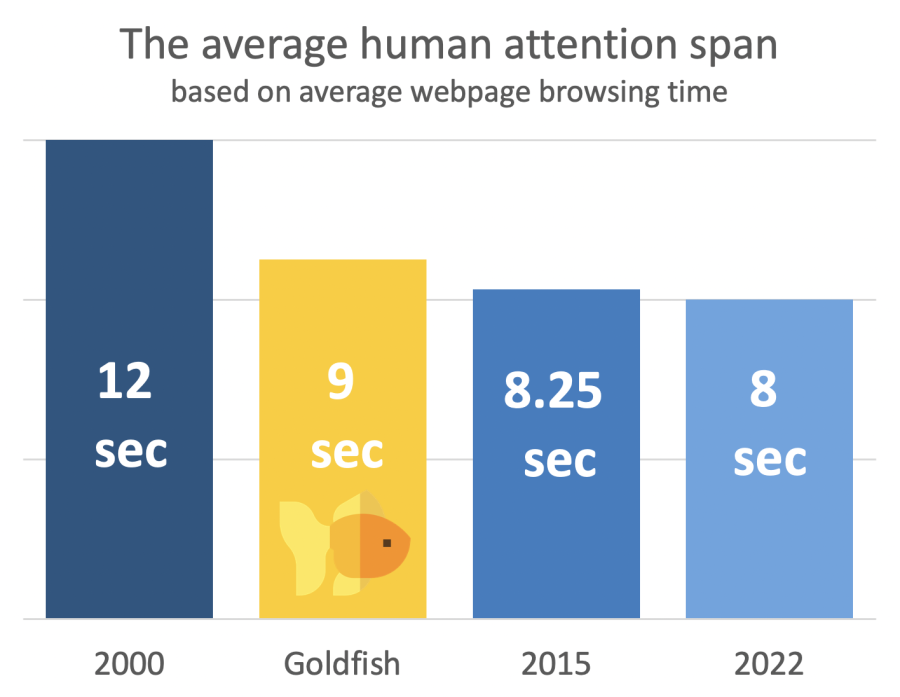Focus On Your Focus
June 12, 2023
Over the past couple of decades, the attention span of the average individual has been measured, and studies are proving that our attention spans are persistently deteriorating. When we think of the word “focus” or the words “attention span” we tend to overlook what these words truly mean. Perhaps we can credit this to semantic satiation, however in order to properly understand why our declining focus is a prominent issue, we fundamentally need to understand what the word “focus” means. This word refers to our ability to be productive and have full mental presence and concentration. While related, “attention” and “focus” are not the same. Attention is essentially just observing and listening, whereas focus is a more dignified version of attention. Focus requires an increased mental exertion and refers to the ability to zone in and tune out distractions; it means centering on not only the whole picture, but the minutiae as well.
Gloria Mark, eminent for her book Attention Span, released earlier this year, statistically elaborates on the attention span decline, explaining, “In 2004, we measured the average attention on a screen to be two and a half minutes.. Some years later, we found attention spans to be about seventy-five seconds. Now we find people can only pay attention to one screen for an average of forty-seven seconds.” Evidently, the future of the average attention span is not looking too promising. So, how did we get here?
There is a direct correlation between our short attention spans and the rise in technology and social media. Through social media, we are constantly viewing short videos, simply referred to as “shorts.” These videos are one of the most addicting forms of entertainment currently. These low-cognition requiring videos, easily leave us wanting more and more. However, the more shorts we view, we develop of a familiar expectancy. Due to the plethora of time the average individual spends on social media, it becomes difficult for individuals to separate their online lives with their offline lives. As a result of time spent on social media, watching shorts, individuals become impatient, as their ability to focus deteriorates. As the videos on social media get shorter, coincidently so does our ability to focus. Moreover, with recent studies conveying the increase in the already stratospheric usage of social media, we can understand why there is decline in the focus of individuals.
Now, being that we are aware of the paucity of focus, we must do something about this significant ongoing regression.
But why?
The constant deterioration our society is facing today, is setting a normalcy, which is a serious issue. Because of our weak attention spans, individuals are susceptible to multitasking. However, because of the paucity of focus, when our attention shifts, we are not truly ‘multitasking.’ While we are performing multiple tasks simultaneously, we are unfortunately not able to manage these tasks and complete them effectively. Our attempts at multitasking result in us making more errors and slows our performance, thus making us inefficient. In a video from the American Psychological Association, Gloria Mark labels this as a “switch-cost,” as she elaborates, “everytime you switch your attention, you have to reorient to that new activity–that new thing you’re paying attention to, and it takes a little bit of time.” Clearly, our weak focus causes us to be less productive and efficient, all while using our mental resources and unfortunately adding to the workload we have at hand. Since we are taking breaks randomly, when we try to jump back into our work instantly, we will fail and our focus will remain feeble.
What can we do about this?
If you are planning on taking anything from this article, I would advise you to not only focus on the issue, but more importantly I would recommend you to focus on solving this issue.
If you ask any truly focused individual, I am positive that they will tell you that with hard-work and mental exertion, breaks are crucial. But while breaks are important, nonetheless there is a distinction between random breaks and a true meaningful break. If we continue to neglect these meaningful breaks, and instead take whimsical breaks our performance will suffer thus. However there is a solution. If we start taking breaks at a more natural point, when we get back to work, it will take us less effort to regather our thoughts. Gloria Mark refers to this break method as “break points,” which she explains should be planned. For example, let’s consider myself, writing this article. When I write articles for the newspaper, I usually break the process down into three parts: research and note-taking, writing, and revising. As I complete each step, I allow myself to take a mental break–away from my computer and desk, where I can recharge and gain my focus back. My break points allow me to work and rest productively. Furthermore, as I write and practice this method of resting, I notice that my attention span is expanding, and that I can work without a break for a little longer each time I write.
Since I push myself to my limits and practice taking efficient and effective breaks, I am able to expand my focus and knowledge, as opposed to quitting and taking random breaks whenever facing the slightest adversity.
I believe that having a strong focus and mental presence can be one of the most constructive assets a person can have, which is why I also believe that we must focus on the prominent issue at hand: the deteriorating focus of our generation.









